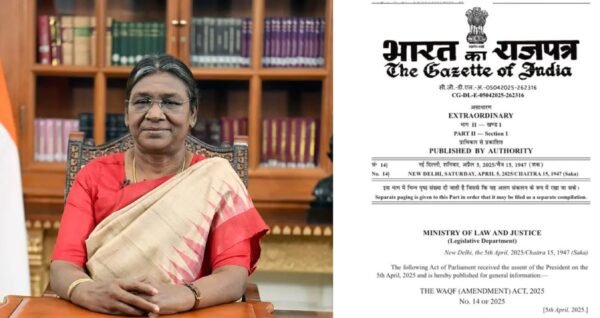Waqf Amendment Bill Gets President Droupadi Murmu’s Assent, Becomes Law

President Droupadi Murmu has given her assent to the Waqf (Amendment) Bill, 2025, officially making it a law. This legislation, renamed as the UMEED Bill (Unified Management Empowerment Efficiency and Development), introduces significant reforms to modernize the management of Waqf properties in India. It aims to enhance transparency, accountability, and efficiency while addressing longstanding issues in Waqf property administration.
Inclusion and Diversity:
Non-Muslim members are now included in both central and state Waqf boards to promote inclusivity.
Representation from various Muslim sects and backward classes is mandated.
Elimination of ‘Waqf by User’:
The provision allowing properties to be designated as Waqf based on long-term religious use has been removed. However, properties registered under this provision before the enactment will retain their status unless disputed by the government.
Inheritance Protections:
Women and children must receive their rightful inheritance before any property is declared as Waqf, with special safeguards for widows, divorced women, and orphans.
Legal Reforms:
The Limitation Act, 1963, is now applicable to Waqf property disputes to reduce prolonged legal battles.
Disputes over government properties claimed as Waqf will be investigated by senior officials above the rank of collector.
Strengthened Governance:
A centralized portal will be introduced for registering Waqf properties within six months to improve transparency.
Audits are mandated for Waqf institutions earning over ₹1 lakh annually.
Protection of Tribal Lands:
Lands under Schedule V and VI of the Constitution are explicitly excluded from being designated as Waqf properties to safeguard tribal rights.
Revised Composition of Waqf Tribunals:
Tribunals will retain a three-member composition for dispute resolution, with appeals allowed to the High Court against tribunal decisions.
Focus on welfare programs for marginalized groups such as Muslim widows and divorcees.
The Act is seen as a watershed moment in reforming the governance of Waqf properties in India. It seeks to address corruption, inefficiencies, and illegal occupations that have hampered the intended charitable purposes of these properties. Prime Minister Narendra Modi hailed the legislation as a step toward transparency and safeguarding rights. Minority Affairs Minister Kiren Rijiju emphasized its potential to benefit millions of poor Muslims without interfering with existing Waqf properties.
While supporters view the Act as progressive, opposition parties have criticized it as divisive and anti-secular. They raised concerns over its implications for minority autonomy and constitutional rights. Despite these objections, all proposed amendments were rejected during parliamentary debates.
The passage of this law marks a significant shift in how Waqf properties are managed in India, aiming for modernization while balancing inclusivity and legal safeguards.
